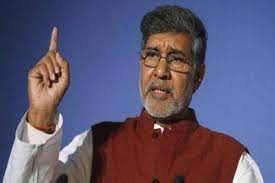UNITED NATIONS, Sept 29: Nobel laureate Kailash Satyarthi has said that USD 52 billion can provide social protection for every child and every pregnant woman in low income countries, underlining that this is “not a big amount” in a world with over 2,000 billionaires.
Speaking at a high-level UN event on ‘Jobs and Social Protection for Poverty Eradication and a Sustainable Recovery’ on Tuesday, Satyarthi, the 2014 Nobel Peace Prize winner, gave a clarion call for bold and proactive leadership to end child labour and poverty.
He said that USD 52 billion can provide social protection for every child and every pregnant woman in low income countries.
“That is not a big amount. This is just two days of COVID relief measures as well as 0.4% of the social protection fund which is spent in rich countries,” he said at the virtual event.
“We are not so poor. I refuse to accept that the world is so poor when 2,755 billionaires exist in this world. We have made progress when we didn’t have enough resources, we helped children and declined child labour,” he said, adding that the world of today is much more resourceful in technology and other areas.
“We did it in the past and we will do in the future. There is no dearth of bold ideas. But what we need is bold leadership in all spheres of life… compassion in leadership, courage in leadership and proactive leadership with a sense of urgency,” he said.
Satyarthi noted that the COVID-19 pandemic has exposed and exacerbated all the injustices and inequalities prevailing in the society and the worst sufferers have been the most marginalised children, particularly in developing, low-income and middle-income countries.
He pointed out that many more children have been pushed into chronic poverty situations due to the pandemic. These children are out of school, denied health care, have no proper adequate access to safe drinking water or safe, clean air.
“They are the children who are sold and bought like animals and sometimes at lesser prices than animals,” he said in his impassioned remarks.
“They are the children who are exploited as child labourers and are breaking their backs for our economies,” he said.
Underlining that “these children are our children,” Satyarthi cautioned that if nations are not able to protect their children, most of the Sustainable Development Goals will not be accomplished.
He voiced worry that even during the pre-pandemic years of 2016-2020, about 10,000 children were pushed into child labour every day.
“There is no excuse for that. There is no justification for that because it was the pre-pandemic time. This is not just apathy and insensitivity of the international community and all of us, including me and you. This is a crime against future of humanity,” he said.
He said the 160 million child labourers are “160 million empty seats in the classrooms” and these are children who are “occupying 160 million jobs of adults.”
Satyarthi noted that even if the spending on education is adequate, “nobody can bring these children to school” untill additional efforts are made in freeing them from the “clutches of their masters.”
He underlined that social protection programmes will be successful especially for the children when “we take swift and direct measures so that these children could be benefitted directly. Only then they will be freed from these situations.”
According to the concept note of event, which was addressed by Finance Minister Nirmala Sitharaman, UN Secretary General Antonio Guterres and several other world leaders and top UN officials, the COVID-19 pandemic continues to serve as a harsh reminder of the perils stemming from global inequities and a reminder of the urgency to redouble efforts towards the achievement of the 2030 Agenda.
“The equivalent of an unprecedented 255 million jobs were lost due to the COVID-19 pandemic. This led to a sharp increase in poverty and inequalities. Declining labour income has been distributed unevenly between workers, with youth, women and low-skilled workers seeing the sharpest drops in disposable income,” the concept note said.
The High-Level event included a policy discussion to frame the ambitions needed for a socio-economic recovery to advance decent job creation, social protection and poverty eradication.
The event focussed on pressing issues including application of effective economic, social and environmental policies at country level through dialogue with social partners and other stakeholders; global norms and standards underpinning the socio-economic recovery and a just transition and current efforts to achieve just transitions in the context of ambitious climate action and the COVID-19 recovery and solutions that support accelerating and scaling up these efforts, particularly in developing countries. (PTI)
Trending Now
E-Paper


